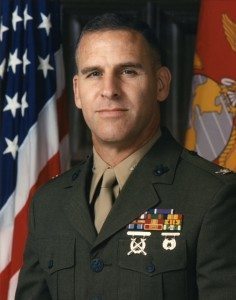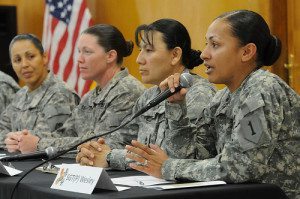
During the 1968 Tet Offensive, then Captain Gordon Batcheller earned the Navy Cross when his unit, Company A, 1st Battalion Marines, engaged a numerically superior force of the North Vietnamese Army. Although injured by shrapnel, he aggressively led his men in a fierce assault against the enemy and was seriously wounded in both legs when the column began receiving heavy fire from both flanks.
He supported himself with his elbows, resolutely continued to direct his men, and bravely encouraged those near him even as he lay receiving medical treatment. As a result of his determined efforts, the reaction force reached the embattled city of Hue.
Colonel Batcheller joined the Marine Corps in 1960 and retired in 1991. His assignments included rifle platoon commander, 81mm mortar platoon commander, rifle company executive officer, rifle company commander, landing support battalion commander, and infantry battalion commander. He is a National War College graduate, and was a professor of military and strategic studies for seven years at the Army Management Staff College.
Women in Combat
Why We Should Not Send Our Mothers, Wives
and Daughters to Fight Our Wars
Crusade Magazine: Do you think that the current operational effectiveness of our military is lacking because we refuse to allow women in combat?
Colonel Gordon Batcheller: For the last forty years we have deliberately increased the involvement of women in combat. They fly combat airplanes and helicopters, man navy ships, including nuclear submarines, and fill combat support and service positions that expose them to close combat. Just recently 14,000 positions in the combat zone were opened to women. Civilians are pressuring the military, primarily the Army and Marine Corps, to open the infantry and other combat arms positions to women.
The process started when the All Volunteer Force discovered it wasn’t getting enough men; rudely put, women weren’t better than men, but they were better than nothing, at least when restricted to assignments where their associated friction could be best managed. As their presence increased, so did substantial evidence of the difficulties the mix created. No one has sought more women to better the combat force or claimed that our current mixed force is more effective than an all male force would be; and no historian has held that a coed force would have fought any of our wars more effectively than they were fought. If women improved the force’s combat effectiveness, you would expect the military to pressure its civilian master to give it more women without restrictions.
The pressure today is in the other direction; civilians are trying to impose a less effective force on the military.
 Learn All About the Prophecies of Our Lady of Good Success About Our Times
Learn All About the Prophecies of Our Lady of Good Success About Our Times
Crusade: Would allowing women in combat positions lead to the loss of combat effectiveness? If so why and how?
Colonel Batcheller: Yes! I guess the basic reason is that women are not equal substitutes for men. They are different, and this causes a host of problems. It is not their “fault,” nor is it attributable to any inherent incompetence. Women are different, and men view and treat them as such. Our cultural values, distilled from our Judeo-Christian civilization affirm this truth and inform us on what is appropriate or acceptable.
Effectiveness in combat depends on trained individuals, bound by trust and confidence — a belief ultimately that we will do right by each other. I have never known any man who thought it right to expose women to the butchery he will accept for himself or his male colleagues. Our idea of manhood would hold such butchery as shameful. Shame is not an inspiring war-winning emotion.
The infantry lives and works in a violent, barbaric world where the most grotesque of Hollywood’s special effects is routine reality. There is no quality of life beyond staying alive: no comfort, no privacy, and no provisions for hygiene. Endurance — both physical and emotional — and raw strength are essential. The battlefield is a man’s world.
Crusade: Should we want our women to fight? Why not?
Colonel Batcheller: The values of our major religions, Western Civilization, and our culture say “no.” The values that sustain our military say “no.” Our idea of manhood says it would be shameful.
The thought of sending wives, mothers, and daughters to fight our wars while their men drive the children to soccer practice is contemptible. It is not that women cannot fight and kill and help us repel an attack or invasion in a “last stand.” But our culture objects to enlisting them in a “first call” case, and operational effectiveness resists their involvement in any case. Ideally, the military would be a male operation. In our world the challenge is to find a sensible, cost-effective use of women in the military while keeping them where they would not have to fight, or be able to distract or disrupt those fighting.
Crusade: Back in 1993, surveys showed that an overwhelming majority of women said they did not want to be in a combat unit. Is there a purpose for women to be placed in infantry positions?

Colonel Batcheller: Not on the basis of military merit. Militant feminists and diversity worshippers have their fatuous “purposes,” but no positive purpose motivates the military to put women in foxholes.
While some seek to radically change the United States by destroying our current values, others seek to weaken the military and humble our nation. One does not have to be a conspiracy nut to acknowledge that such people exist and are active, and that this destructive initiative fits their purposes.
Some advocates also insist it is a woman’s right to serve in the military if she wants. That, of course, is nonsense. The military is created and structured to win wars, and its personnel policies are crafted to serve that end, not satisfy vocational whims.
Crusade: Some claim women push for infantry positions because they want to achieve higher rank and advance their careers. Is this being forced on women or is it something they want?
Colonel Batcheller: It is fair to say that achieving high rank is dependent on having had the “right” jobs, and having done them well. Command assignments of combat units during combat are essential for professional credibility.
A female Marine communicator is not going to become commandant. But the military exists to win wars, not to provide successful career patterns. Personnel policies, and their derivative assignments, are for the good of the service, not the happiness of the individuals being assigned.
Crusade: Do mixed units favor the enemy when it comes to combat?
Colonel Batcheller: Yes. By weakening our side we help the enemies. You will hear of the success other countries have had with coed forces, with Israel usually mentioned as the ultimate proof. But it is my understanding that the Israelis have found the concept doesn’t work and have abandoned it. The male soldiers became too concerned, protective and distracted. Women help defend their kibbutz just like American women helped defend their wagon train or homestead; and they serve in the military, but not in coed combat formations.
Crusade: People have made this issue one about gender equality. How would you answer those who subscribe to this ideological egalitarianism?
Colonel Batcheller: Men and women may be equal in the Declaration of Independence, but how many women play in the National Football League? College football? High School football? Last time I looked, men and women are different. And even if the differences created no performance advantages, the inescapable sexual dynamics inflict seriously disruptive forces on our coed organizations. The military exists to win wars, not to serve as an equal opportunity employer.
Crusade: Could you comment on the physical requirements of combat and are women capable of enduring it?
Colonel Batcheller: My experience was as an infantryman. Our world was somewhat different than that of a tank crewman or artillery officer. We had to be half beast of burden and operate far off the beaten track and beyond reach of reliable mechanical support. Conditions were primitive, quality of life non-existent, exposure to the elements constant. What we had, we pretty much carried. Coverage of the wars of the last ten years has provided a good picture of the loads carried by individual soldiers during operations — loads increase when units have to relocate. Upper body strength and load-carrying ability are essential — the stronger and more enduring, the more valuable.
We have never been able to reduce the individual soldier’s personal load — it frequently exceeds 75 pounds, before you add a wounded colleague. Women in such an environment quickly become liabilities. Nor would they function well in the miserable living conditions, lack of privacy, absence of hygiene and so forth. It’s a man’s world.
Crusade: Are there emotional issues that need to be addressed?
Colonel Batcheller: There would be emotional issues for both sexes, and for the nation as a whole. This is something alien to our national character and hostile to our concept of civilization. The butchery of our wives and daughters and mothers would generate a national mood of sadness and shame. There has been no coverage of the killed and disabled women in Iraq and Afghanistan, even as we “celebrate” the male wounded warriors. We’re proud of our fighting forces, but ashamed that they include women. Infantrymen would feel this shame tenfold — they can handle the butchery until it involves someone that reminds them of their kid sister.
Crusade: What should we expect from the enemy should a woman combatant fall into their hands?
Colonel Batcheller: History has answered this question. Human nature hasn’t changed. Our enemies seldom start with our basic values, and combat is corrosive and de-humanizing. But, if we’re comfortable ordering our women and girls into the explosive violence of the battlefield, why should we be upset if they are violated?
Crusade: Based on your experience, do you think our young servicemen could, over time, be trained to treat women troops the same as men?
Colonel Batcheller: No. Nor would women accept being treated as men. This issue becomes especially significant in leader/led relationships. Most men have serious problems subordinating to women in a neutral environment. This would only get worse in a masculine environment. Thinking we can eliminate or tame sex reflects colossal arrogance, or stupidity.

Crusade: Because this is such a politically charged issue, do you think some are afraid to express their honest opinion? If so, do you feel that this limits our ability to make the best choice for our national security?
Colonel Batcheller: Yes. The military is properly subordinate to civilian authorities. The Commander-in-Chief is the President, the rule writers and check payers are Congress. Most of us have trouble “taking on the boss.” In the military there are additional concerns about disloyalty, disobedience, and insubordination.
Additionally, the “pyramids” of these organizations are manned by ambitious individuals who generally want to keep their careers alive. Candor and honesty are dangerous, sometimes fatal.
We have had four-star officers — generals and admirals, active duty and retired — publicly support the admission of homosexuals into the military, and the assignment of women into combat roles. None argued from military merit or advantage; it was the politically advantageous thing to do. Washington is a corrosive, disorienting environment. The major “players” are politicians, even if they wear a uniform.
Very few leave Washington with more virtue than they brought in. Some go over to the dark side, most find reasons to justify not being contentious, or accept unsound policies after token opposition. Given the ignorance Congress and the President demonstrate about military matters, we should expect to observe respectful resistance from our military “leaders” with public examination of the objects of disagreement. For a host of reasons, we don’t. National security suffers as it ultimately depends upon an educated citizenry. Don’t believe anyone that says this is not a serious morale problem.
There is another major concern that is widespread, but difficult to isolate. Producing combat units — companies and battalions and squadrons and such — is a complex undertaking, and the primary business of the military. In the face of complexity the sacred tenet of KISS — Keep It Simple Stupid — is frequently invoked. Adding women to the mix creates frictions and burdens not only in the units where they mix, but in service-wide areas of personnel management, logistics, facilities, and administration; the more pervasive the mix, the more extensive the costs. All the Service academies have experienced sex-based scandals, and all services have been plagued with such misconduct, both in operational units and the support establishment. The cumulative cost of our coed military in time and effort is beyond calculation, but considerable.
Read Also:
Statement of Col. John W. Ripley before the House Armed Services Committee
Playing Games with Our Wars and War with Our Games

